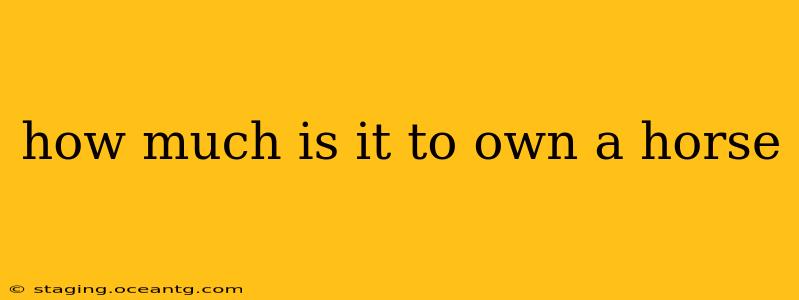How Much Does it Really Cost to Own a Horse? A Comprehensive Guide
Owning a horse is a deeply rewarding experience, but it's also a significant financial commitment. The costs extend far beyond the initial purchase price, encompassing a wide range of expenses that can quickly add up. This guide will break down the various costs involved, helping you realistically assess the financial implications of horse ownership.
Initial Costs:
-
Purchase Price: This varies dramatically depending on the horse's breed, age, training, and bloodlines. A beginner's horse might cost anywhere from a few thousand dollars to tens of thousands, while experienced show horses or top-quality breeding stock can easily reach six figures.
-
Veterinary Examination: Before purchasing a horse, a pre-purchase veterinary exam is crucial. This can cost several hundred dollars and helps identify any potential health issues.
-
Transportation: Transporting your horse to its new home involves additional costs, depending on the distance. You might need to hire a horse trailer and driver, or pay for professional transportation.
Recurring Monthly Costs:
-
Boarding: This is often the largest recurring expense. Boarding fees vary widely depending on location, facilities offered (stall, pasture, etc.), and level of care. Expect to pay anywhere from $300 to $1500+ per month.
-
Feed: Horses require high-quality feed, including hay, grain, and supplements. The cost depends on the horse's size, workload, and dietary needs. Plan for at least $200-$500 per month, possibly more.
-
Veterinary Care: Routine veterinary care, including vaccinations, dental care, and parasite control, is essential. Budget at least $50-$150 per month, although unforeseen veterinary expenses can be far higher.
-
Farrier: Horses need their hooves trimmed or shod regularly by a farrier. This typically costs $50-$150 every 4-6 weeks.
-
Equine Insurance: Protecting your investment with insurance is highly recommended. Premiums vary depending on the horse's value and coverage level.
-
Tack and Equipment: While initial tack purchases represent a significant upfront cost, you'll need to replace or repair items over time. Budget for ongoing maintenance and occasional replacements.
Additional Annual Costs:
-
Coggins Test: This blood test is required for showing, transporting, and many other activities.
-
Worming: Regular deworming is crucial for maintaining your horse's health.
-
Professional Services: Depending on your horse's needs, you may require the services of a veterinarian, farrier, trainer, or other equine professionals, which adds to the overall cost.
Hidden Costs to Consider:
-
Emergency Veterinary Care: Unexpected illnesses or injuries can lead to substantial veterinary bills, potentially thousands of dollars.
-
Training: If your horse requires training, this can add a significant expense.
-
Competition Fees: If you plan to compete, factor in entry fees, travel, and stabling costs.
-
Equipment Repairs and Replacements: Saddles, bridles, and other equipment will need repair or replacement over time.
How Much Is It to Own a Horse? A Range of Estimates
Based on the above breakdown, the total cost of owning a horse can range from $3,000 to $10,000+ per year, potentially much more depending on the horse's needs and the level of care and activities you provide. This does not include the initial purchase price, which can range from a few thousand to hundreds of thousands of dollars.
What are the different types of horse boarding?
There are several types of horse boarding, each with varying levels of service and costs:
-
Full Board: Includes stall or pasture, hay, grain, daily care, and use of facilities.
-
Partial Board: Provides stall or pasture and hay, but the owner is responsible for grain and some or all of the daily care.
-
Pasture Board: Simplest form, providing only pasture access. Owner is responsible for all other aspects of care.
-
DIY Boarding: Owner is responsible for all aspects of care, including feeding, mucking stalls, and general maintenance.
What are the most common hidden costs of owning a horse?
The most common hidden costs are emergency veterinary care, unexpected equipment repairs, and the ongoing cost of maintenance and minor repairs around the stable or facilities. It's important to build a financial buffer to cover these unforeseen expenses.
How can I save money on horse ownership?
Consider DIY activities such as mucking stalls or purchasing hay in bulk. Choosing a less expensive breed or horse that requires less extensive care can also save money. Research and planning are key to minimizing costs without sacrificing your horse's well-being.
Owning a horse is a significant financial commitment. By carefully considering all the expenses involved, both upfront and ongoing, you can ensure you're prepared for the responsibilities and joys of horse ownership.
